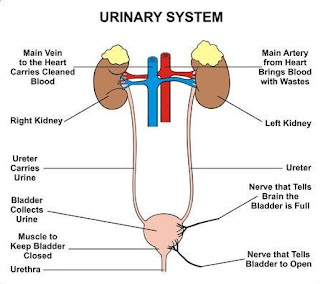Normal Chemical Composition of Urine
Urine is an aqueous solution of greater than 95% water, with a minimum of these remaining constituents, in order of decreasing concentration:
Urea 9.3 g/L.
Chloride 1.87 g/L.
Sodium 1.17 g/L.
Potassium 0.750 g/L.
Creatinine 0.670 g/L .
Other dissolved ions, inorganic and organic compounds (proteins, hormones, metabolites).
Abnormal Types of Urine
Proteinuria—Protein in urine, often due to leaky or damaged glomeruli.
Oliguria—An abnormally small amount of urine(<400ml), often due to shock or kidney damage.
Polyuria—An abnormally large amount of urine, often caused by diabetes.
Dysuria—Painful or uncomfortable urination, often from urinary tract infections.
Hematuria—Red blood cells in urine, from infection or injury.
Glycosuria—Glucose in urine, due to excess plasma glucose in diabetes, beyond the amount able to be reabsorbed in the proximal convoluted tubule.
Hematuria (2-5 HPF)as a symptom as result of blood vessels inflammation in kidney glomeruli (ex. glomerulonephritis)
It is RENAL PAINLESS hematuria .
- MICROHEMATURIA should be detected only by microscopy. In microhematuria the color of urine is not changed.
- MACROHEMATURIA the urine containing big amount of red blood cells (smoky or cola color urine).
- Isolated hamaturia
leukocyturia : presence of white blood cells in the urine.
Causes of proteinuria
- Primary glomerulonephritis: IgA nephropathy, minimal change GN, MGN, FSGS, MPGN
- Secondary: Diabetic nephropathy, SLE,amyloidosis, preeclampsia, infection (heptitis B,C,HIV, post streptococcal GN, syphilis, malaria, endocarditis), cancer (Lung, GI), Renal transplant refection.
- Drug induced glomerulopathy: NSAIDS, Heroin, Lithium, heavy metals
2) Tubular causes (decrease reabsorption)
- Hypertensive nephrosclerosis
- Uric acid nephropathy
- Interstitial nephritis
- Drug: NSAIDS, heavy metals
Renal Casts - Renal tubules ‘Imprints’
Absent in normal people, except for a few (0-5) hyaline casts per LPF.
Types of Renal cast:
Hyaline casts: made of protein, caused by dehydration, exercise, diuretic medicine
Granular casts: Include prominent granules; related to underlying kidney disease.
Fatty cast : condition of lipiduria (lipids in urine); related to nephrotic syndrome
RBC cast : Result of bleeding into tubules from the glomerulus , nephrotic syndrome
WBC cast: Interstitial cell kidney disease (interstitial inflammation, pyelonephritis and parenchymal infection)
Renal tubular epithelial cell cast : damage to the tubules i.e renal tubular necrosis


Post a Comment
If you have any doubts, please let me know